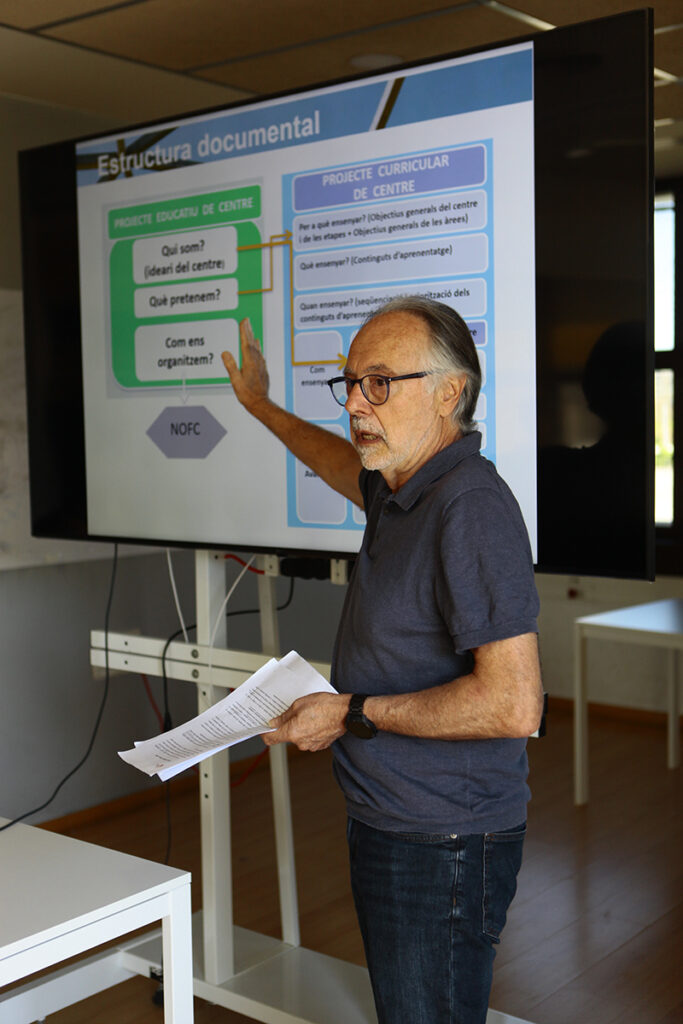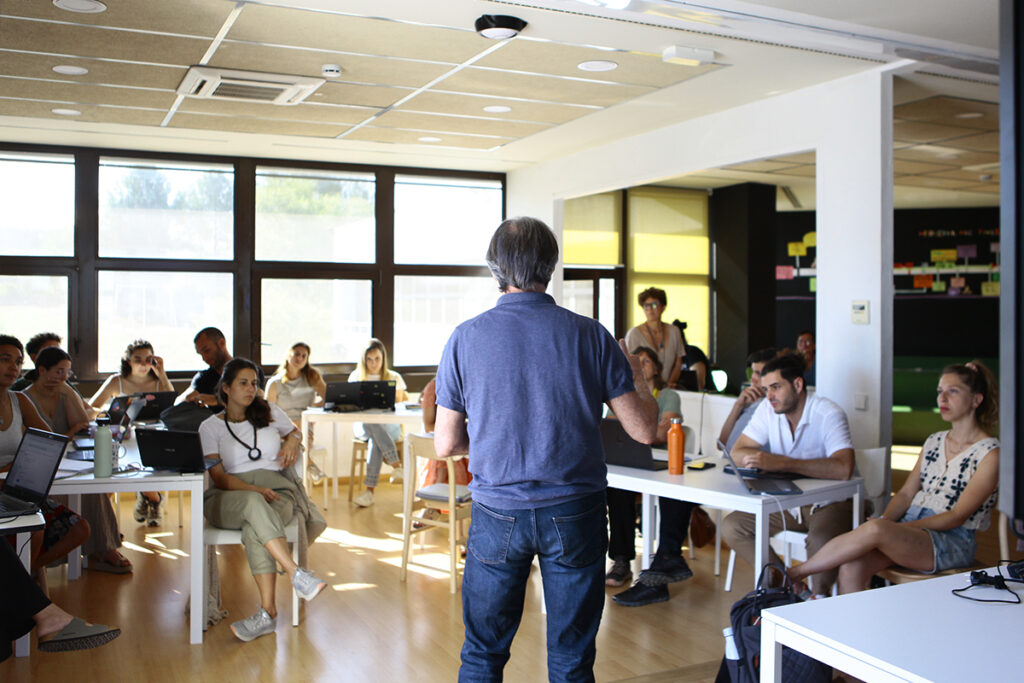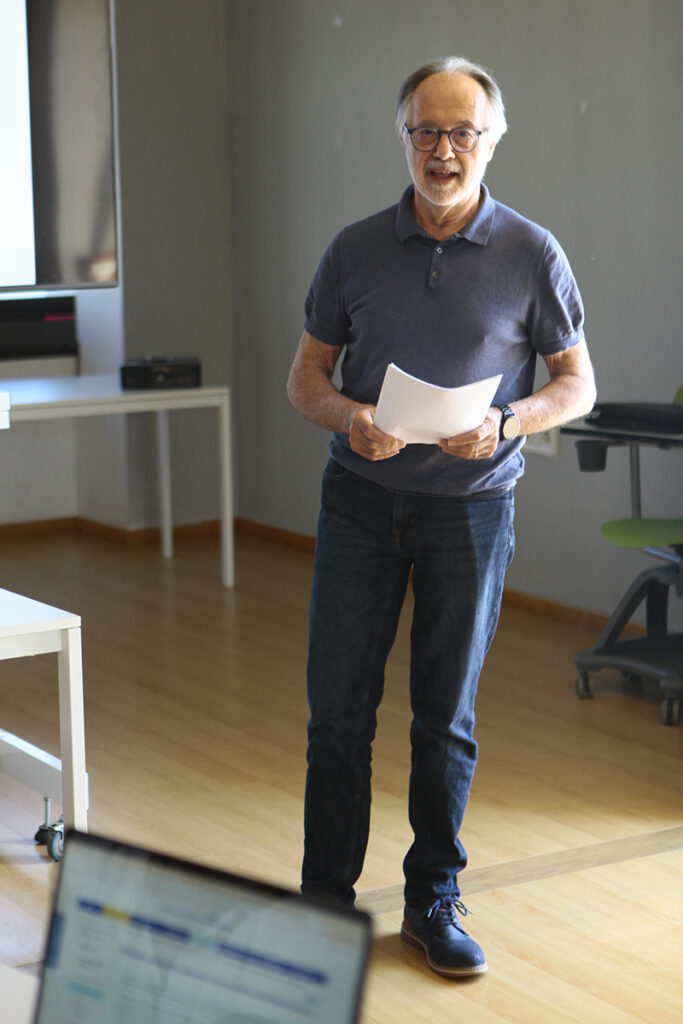With decades of experience in the world of education, Antoni Zabala i Vidiella He is an important reference in the world of pedagogy in Catalonia, with a long career that includes the direction of the Institute of Resources and Research for Training (IRIF), the foundation of the journal Guix. Element of Educational Action and the address of the publication Educational Innovation Classroom.
In addition to having advised the Generalitat of Catalonia and other autonomous communities, to Ministry of Education and to Government of Andorra in training plans and curricular designs, he has also collaborated with numerous administrations and educational entities in Latin America.
This pedagogue, expert in basic skills and author of nine books on education, has been in the CreaNova School to carry out training on project work.
At the end, we talked with him about the changes in education and how to focus the programs under the system Learning by Doing.
– It is often said that education is out of date with what society needs. Is this true?
– We see several transformations in the global educational process. And like every process, There is a crisis; because we are leaving a model based on preparatory training, where the objective is to move from stage to stage, from first to second, from second to third, etc.; and that It doesn't matter so much what I've learned. AND It is a selective system, thinking not so much about the purposes of the school, but about what they are going to ask me for in the university entrance exam.

– And what about what society demands of students?
– We come from that model, which thought that memorizing mechanically could be successful. And That's a mistake, because if I want to use knowledge to give answers to the world, I have to learn what makes sense, not what doesn't make sense.
But that model is changing in relation to what school should be, which is not just about preparing university students, but rather a society that claims to be democratic requires that the entire society be educated, whether or not they are university students.
– What would that change look like?
– In this change we must give answers to problems which will raise life not only in the professional and academic field, but also interpersonal or social. The contents change, others are added, it is no longer enough to know the Boyle-Mariotte formula, but know what the hell it's for me, to understand what happens to gases.
Another change concerns knowledge, how two people learn. Here we must take into account the different characteristics of each one, so we must promote a meaningful and functional learning. It is about creating models of knowledge constructionMechanical repetition is not useful to me, I have to know how to understand it, and that implies a personal construction, because we know that each person builds knowledge from his or her sociocultural context, with his or her cognitive abilities, etc.
– This change of model is like a paradigm shift from the sophist method to the Socratic method, which you have referred to before. What would this analogy be like?
– In the 5th century BC the sophists said 'I have the knowledge, and you as a student have to reproduce what I tell you'. On the other hand, Socrates said that I have to help you learn from maieutics, that is, the Socratic dialogue, where you have to ask yourself questions, and from them, with the dialogue you build knowledge.

– So it is an exchange between teachers and students.
– Obviously, the knowledge we have now is the Socratic model, which is the appropriate, which is what we have when we open the door to ask ourselves why things happen.
Of course there is also a methodological change, classrooms of 40 students where I tell a story and you learn are no longer enough for me. It is a complex process that leads us to Personalization of learning, to give each one the means to build from their possibilities, their cognitive capacities and their cultural environment. This implies a identification work of each student.
– The key to this would be small groups…
– Of course, the ideal is that I, as a teacher, can get to know each of the students in depending on its characteristicsAnd obviously, if there are few in a class, it is easier.
Let us remember that the scientific knowledge we have now is the same as They had in medicine, when it was concluded that there are no diseases but that there are sick people, and each one needs a different treatment.
In education, we know that the learning process involves personalized attention. The advantage we have is that we learn more among equals than from teacher-student relationships.
– And why is this?
– Because peer learning It creates a concern in the classroom, and having students interact with each other makes it easier for them to seek out learning than if I'm doing it one on one.
– It's like the philosophy of CreaNova School, which is 'learning by doing'.
– Obviously, when we talk about the 'Learning by doing' system it is because We learn when we do things, when we pose problems. And that is the motto, although the most appropriate might be 'Learning by doing for thinking', because doing is to build knowledgeIn other words: knowledge is not transferred if there is no prior construction process.
– What are the differential values that CreaNova School has to promote this path?
– One of the advantages of CreaNova School, which has been since its inception, is to give to each student what he needs, and also while they are doing things. For this it is necessary to have small groups, of 15 to 20 students per class. But the important thing is not that they are few just because, but to be able to help in the dialogues, the observations, the reflections between them. So that they go building knowledge.

– When we talk about personalization, it is said that it does not matter whether a student becomes a doctor or an engineer tomorrow, but rather that he or she is happy while learning.
– One of the bases of CreaNova School It is the foundation on what is done, and that foundation must be scientificOf course we want a doctor or engineer to be happy, because happiness in itself is not an end, but a means. In other words, I cannot learn well if I am not happy.
– It is a totally different concept from those old methods, where cold showers were considered correct in order to be strong and learn to face society.
– Of course, it is not about preparing strong people to be entrepreneurs and know how to solve problems. We will do it training them through happiness. For example, an athlete, a soccer player, will have to work a lot on punching, meditation, but he will also train through rondo, which is a fun way to learn how to move the ball, how to change the position of the foot. These are exercises where they have fun. And they pay a lot!
Well, at school we have to do exercise activities because they are necessary for the effort to be made, for the students to see that the effort is worth it. And also, in a playful way, where the game is not the goal, but rather the means to exercise so that the learning process is more enjoyable.




